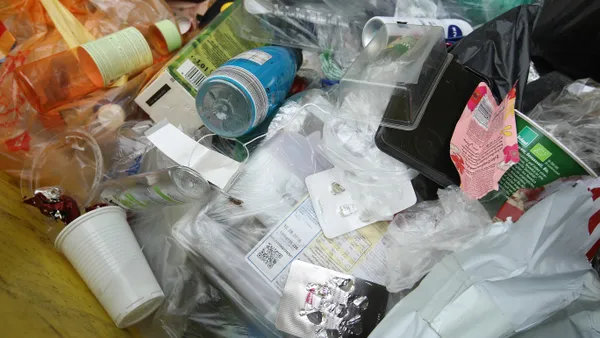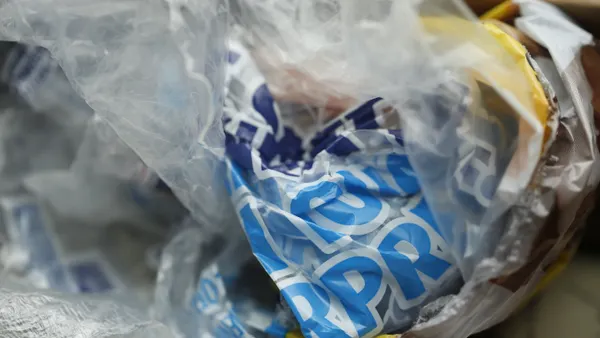Dive Brief:
- During this year's Waste Management Sustainability Forum in Phoenix, CEO Jim Fish said the industry needed "to do more faster" when it comes to recycling. He drew comparisons to President Kennedy's call for boldness in the "moonshot" space program of the 1960s. "Being bold starts with recognizing the truth and dealing with reality. China's ban and restrictions have been a wake-up call for our industry," said Fish. "Resiliency, innovation and imagination are needed."
- Multiple speakers, including Fish, said this needed to start with recognizing recycling's purpose of generating quality feedstock for manufacturing, rather than meeting weight-based goals. Myles Cohen, president of Pratt Recycling, spoke about rising contamination levels and called for a reset on accepted materials. "We need a moratorium on new items, because otherwise we will jeopardize the residential recycling system in this country if contamination gets any worse," he said.
- During a session on sustainable materials management, a senior policy analyst for the Oregon Department of Environmental Quality went even further about how modern recycling programs were no longer supporting the manufacturing supply chain. "Many programs have lost sight of this and they treat recycling as just a different and better way of moving around garbage," said David Allaway. "Industry cannot make products out of garbage."
Dive Insight:
This annual forum has become the industry's version of a star-studded event — with appearances by Mike Rowe, Chicago Mayor Rahm Emmanuel and Bill Gates — and attracts top professionals from around the country. Unlike many of the more technical shows, this one was long on big ideas and shorter on specifics.
Sweeping statements about the need to preserve natural resources for future generations, becoming more resilient to the changing climate and adapting to the global economy were the norm.
Fish pledged to make an unspecific "moonshot" investment in reducing the company's emissions by a factor of four in the coming years and repeatedly described the environment as Waste Management's "voiceless" "fifth constituent." Not taking care of it, he said, would be "grossly hypocritical." With this in mind, he commended China for taking steps to protect its own environment and supported the concept of waste reduction.
Less mention was made, by Fish or others, about what the shift to new markets in Southeast Asia will mean for the environments of those countries, or how the company's projection of growing waste volumes is often touted as a reassuring sign for financial analysts on earnings calls.
Also not mentioned were how recycling costs are projected to keep rising for customers because it's gotten harder for companies to profit from the service, and how the industry-wide rush to single stream has played a role in rising contamination rates.
The intricacies involved in any one of these topics are what make recycling such an intractable environmental challenge. It has become a part of modern culture — from "zero waste" sporting events to pledges for 100% recycling rates for packaging by various future dates — but has also lost its way by many accounts.
China's incessant demand helped foster illusions that ever-escalating diversion rates were possible, while also enabling manufacturers to keep making new packaging, regardless of its back-end value. Now that the music has stopped, the U.S. is left with a diminished manufacturing sector to handle this previously exported material and some of the paper mills here don't even want it.
That all leads back to the questions of why recycling makes sense in the first place, and what end goal it is meant to achieve. If emissions reduction is the overarching goal, to help mitigate the effects of climate change that were borne out in brutal fashion last year, then recycling alone may not be the full solution.
Many of the event's speakers recognized that this would have to be a collaborative effort, but one ripe with opportunity for innovation. Now that Waste Management has positioned itself as a thought leader in this conversation, the industry will be watching to see how far these new "moonshot" plans actually go.










